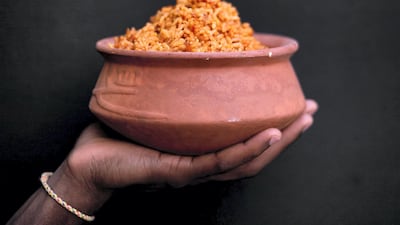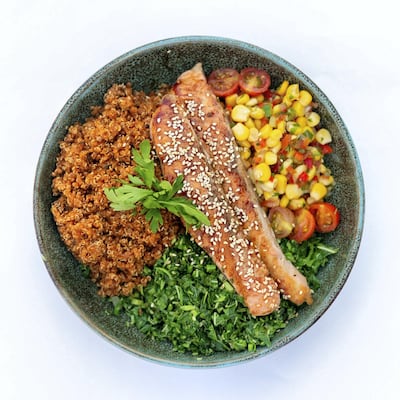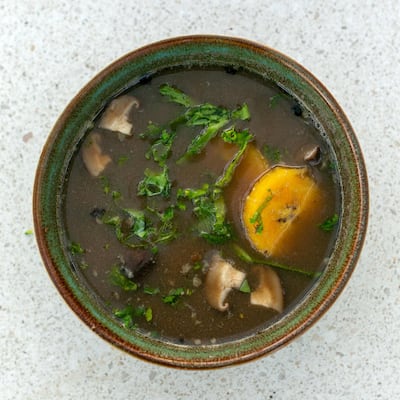Healing African food. Her restaurant’s slogan is a clever play on words, and completely in keeping with what the dynamic Gbemi Giwa – blogger, dancer and now restaurateur – has done at Catfish. The eatery, which operates out of the Kitchen Nation incubator space in Business Bay, offers dishes that originally hail from Nigeria and other parts of West Africa, but with a decidedly more healthy twist.
“African food is full of flavour, but it’s not particularly known for its high nutritional value,” admits Giwa with a laugh. “The focus is very much on starchy carbs, and everything oozes oil. Most of my Nigerian diners are surprised at the lack of oil in our grilled plantains.” Having tried both the fried and grilled variety, I am happy to report that the non-greasiness doesn’t take away from the banana-like fruit’s delicious chewiness; if anything, the flavours are cleaner and altogether more enjoyable.
But that’s the Catfish menu for you. It takes traditional African recipes and recreates them using healthier alternatives or methods of cooking, while retaining the bold and tasty flavours. As she takes me through the menu, Giwa tells me in her engaging, anecdotal manner about some of the “super” ingredients she’s retained or introduced in the dishes.
“A for amaranth,” she begins. “It’s a bushy green leaf textured like kale, with edible grains that are becoming popular as well. We use the efo [leaves] as our staple green in everything.” The ingredient has all the benefits of dark, leafy greens: it’s full of fibre, iron, calcium and magnesium, and is one of the most protein-rich plant-based foods.
“Back home, greens are never eaten cold or raw; we always do them in a sauce, with onions, peppers and, yes, oil,” continues Giwa. “I’ve used amaranth in two ways on the Catfish menu: a side salad of sautéed amaranth greens with coconut oil instead of palm oil, with onions, salt, black pepper and a splash of lemon; and in combination with smashed avocado for a guacamole-type dish.”
Next on her list is the African superfood that everyone’s talking about at present: baobab. While it’s considered by many to come from South Africa, Giwa says the water-storing tree also grows in the dry northern region of Nigeria. “The whole tree is edible – the leaves are used as a cure for malaria, while the seeds are ground into powder and are an excellent source of fibre.” The vitamin-packed pods and powder have become something of a global health craze, and are being used in everything from flavoured soda and ice creams to chocolates and cosmetics. At Catfish, baobab is sprinkled over that most X of Nigerian dishes: jollof rice.
“There’s no party or gathering in Nigeria where jollof is not served. At Catfish, too, we want to build the dish into a lifestyle, to explain its culinary significance to people here. We have a vegan option cooked in vegetable instead of meat stock, jollof quinoa and jollof hummus, and I’m working on a cauliflower rice variant and jollof wraps,” says Giwa. “But coming back to baobab, we put it in our jollof rice in powder form, to boost the fibre content in this non-avoidable carb dish. It also goes in our sauces, and we will soon launch a smoothie and juice line that will feature baobab in its raw form.”
Moringa is next on the list. Also known as the drumstick tree, the plant is a rich source of vitamins A, B and C, as well as being a powerful antioxidant that protects the skin right down to the tissue. “It’s a fantastic ingredient, which we use a lot of in our marinades and all our chicken dishes. So the basil-pepper chicken is made with peppers, onion, garlic, ginger and moringa, which adds that extra health benefit. The food already has a lot of flavour, but I’m trying to experiment and make up for its general lack in the nutritional aspect of things,” Giwa reiterates.
As she cites her next key ingredient – scotch bonnet peppers – Giwa rues that the one thing she regrets having to tone down in the Catfish menu is the level of spice. “When I was younger, even my cough medicine was laced with chillies. They are a huge part of our diet back home, but I’ve had to water it down considerably,” she says. “The food is not made spicy because I want it to be accessible to everyone. But,” she adds with a laugh, “if you put a note saying you want it extra-spicy, we’ll ensure we take it there.
Giwa says the scotch bonnet adds a warmth and depth to the flavour of a dish without being overwhelmingly spicy. “Peppers fire up the system, cleanse it and give you more energy. They are a must-have.”
Bone broth, which made a comeback last year, is available on the restaurant’s menu in four forms, including a vegan option made from mushrooms, carrots and other vegetables. The fourth variant is the omega-rich catfish broth.
“We get the whole fish, fillet and skin it, then wrap it in banana leaf and marinate that for a different dish,” explains Giwa. “For the broth, we take the skin, bones and heads, and make a stock out of that, which is slow-cooked for six hours. The resultant broth or soup is simply packed full of collagen. It also fits perfectly with our menu, which is designed to use everything. Not wasting is a big thing for us.”
Catfish operates its kitchen and shares restaurant space at Kitchen Nation in Business Bay, and its dishes are available for delivery through Deliveroo, Uber Eats, Zomato and Talabaat
____________________
Read more:
Try and buy local farmers’ produce at Taste of Abu Dhabi this year
Tickle your taste buds with flavours of the Philippines
Why 'Table Tales’ is just as much an anecdotal history of Abu Dhabi as it is a cookbook
____________________





